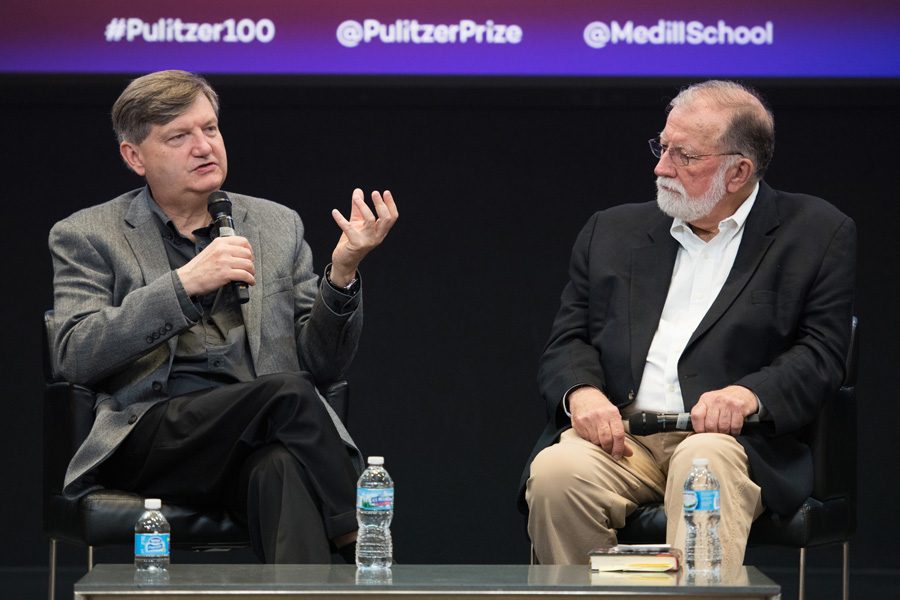Journalist James Risen talks national security, CIA at Pulitzer celebration
Lauren Duquette/Daily Senior Staffer
Journalist James Risen speaks at the McCormick Foundation Center Forum. Risen, a two-time Pulitzer Prize winner, criticized the media’s coverage of the Islamic State, saying it often amounts to “fear mongering.”
May 8, 2016
Journalist James Risen, who said the FBI spied on him while he was writing a book about post-9/11 America, told journalism students Friday they should view the government skeptically.
“Remember to take time to dig in deeper,” he said. “That, to me, is the thing that is getting lost today. People are not willing to just push back.”
Risen (Medill ‘78), a two-time Pulitzer Prize winner for his reporting on national security, criticized journalists’ coverage of the Islamic State, as well as discussed his experience reporting on the Central Intelligence Agency. More than 40 people attended the event, held at the McCormick Foundation Center Forum. The event was part of a day-long symposium hosted by the Medill School of Journalism, Media, Integrated Marketing Communications celebrating the 100th year of the Pulitzer Prize.
During a Q&A session with Medill Prof. Timothy McNulty, Risen said some journalists’ coverage of ISIS amounts to “fear mongering.”
“The rise of ISIS has made people very willing to accept whatever the government says about terrorist threats, and it’s almost as if we are back to square one after 9/11,” Risen said. “When the government says ISIS is 10 feet tall, the press is very prompt in saying, ‘Yes, they are 10 feet tall.’”
A New York Times reporter, Risen won the 2002 Pulitzer Prize for Explanatory Reporting for his coverage of the September 11 attacks. In 2006, he won the Pulitzer Prize for National Reporting for stories about former President George W. Bush’s wiretapping program. He is also the author of four books, including two that focus on the CIA.
Risen — who has covered the CIA for most of his career — said reporting on the intelligence agency is difficult. The agency rarely holds press conferences, he said, and it takes time to build trust with sources.
Risen said traditional ways of interviewing sources — using a pen and paper — work better for secrecy purposes, as the government can use many electronic ways to do surveillance today.
“Almost any relationship you have will have some electronic trace,” Risen said. “If they really want to come after you, they can come after you.”
Risen said the most challenging point in his career came when he was subpoenaed by the Justice Department for a leak investigation in 2008. He spent the next seven years resisting an order to testify and reveal his sources, he said, despite the Bush and Obama administrations threatening to jail him for not complying.
The government’s threats led to bouts with depression, Risen said, but support from his wife and fellow journalists helped him cope.
Roy Harris (Medill ‘68, ‘71), who wrote a book about the Pulitzer Prizes, said he proposed the event to Medill Dean Brad Hamm to celebrate the 100th year of the awards. Harris said the high number of Medill alumni that have won Pulitzers also helped inspire the event.
Weinberg sophomore Mackenzie Eisen, who attended the event, said she is a big fan of Risen.
“He’s one person I really admire in the field,” Eisen said. “He almost went to jail to protect people’s freedom of speech.”
Email: ShanshanZhang2019@u.northwestern.edu
Twitter: @AnnabelleZhang2



